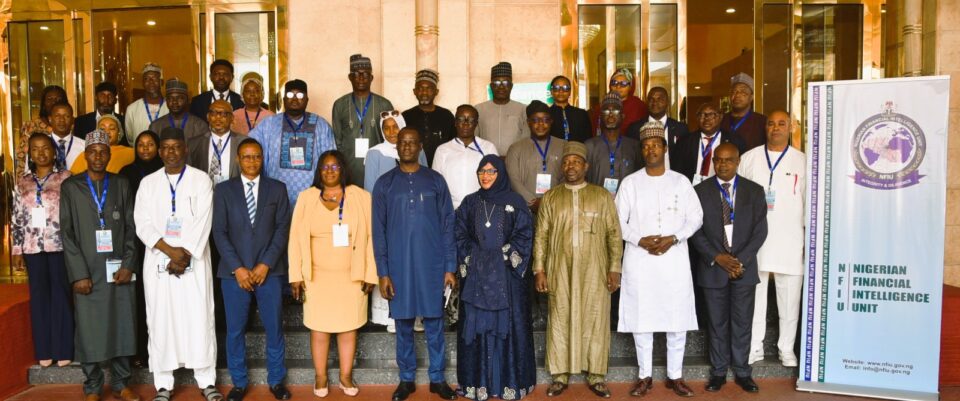By Jane Okeke
The Director General (DG) Nigerian Financial Intelligence Unit (NFIU) Hajiya Hafsat Bakari, has underscored the need for Nigeria to have efficient and effective tax systems to improve domestic revenue mobilization.
Bakari who made the assertion
at the 1st National Revenue Assurance Summit between the NFIU and State Internal Revenue Services, stressed the need to diversify the source of revenue available to government to grow the economy.
The NFIU DG commended the Chairs of all the Internal Revenue Services of the States of the Federation and the Federal Capital Territory who were participants at the summit for their commitment to the vital task of improving domestic revenue mobilization.
She said,”All participants at this meeting are aware of the fact that our nation has moved into a new fiscal era, where the imperative of governance and the need to deliver infrastructure and vital services to our citizens requires innovation and out of the box thinking. At the national and sub-national level, our collective ambition to grow the economy requires us to diversify the source of revenue available to government.
“We cannot afford to rely just on proceeds from the oil and gas industry.
“To build the schools we need, to educate our children, to provide effective healthcare, to build roads and bridges, to secure our communities, we recognise that our focus should shift towards internally generated revenue. Therefore, we need to have efficient and effective systems in place to ensure that everyone pays their fair share of the tax burden. There can be no room for tax avoidance and tax evasion.”
The DG recalled that the role of Financial Intelligence Units to better illustrate the potential “we have to catalyse accelerated revenue generation. FIUs are created as central national authorities responsible for receiving financial reports, accessing a broad range of data sources and conducting analysis based on these to identify suspicious transactions and other potential criminal activity. FIUs produce intelligence reports which are used by investigative and prosecutorial authorities to take action against these offences”.
She noted that historically, FIUs have focused on money laundering and terrorist financing. “However, at the NFIU, we have identified tax crimes and revenue assurance as a critical strategic priority for the Unit. This led us to establish a dedicated Tax Crimes and Revenue Assurance Department, one of the first within any Financial Intelligence Unit globally.
“While our work on tax crimes initially focused on supporting the Federal Inland Revenue Service, we took a further step to explore partnerships with sub-national counterparts. This expansion was predicated on the recognition that the vast majority of tax evasion happens at the State level.
“Our analysis led us to the conclusion that the data on financial transactions held within the Unit would be of tremendous benefit to State Internal Revenue Services as well.”
Bakari however, cautioned that while FIUs were created by international conventions to address criminal activity, the same international conventions and standards require that “we put in place measures to protect the integrity of the information that we provide. To this end, our approach to working with States is built on the establishment of a Memorandum of Understanding which sets out the principles, objectives and limitations of the intelligence provided.
“We have also developed, using our in-house technical resources, a secure platform for requesting and receiving intelligence from the NFIU, the Crime Records Information Management System (CRIMS). Through CRIMS, we have entirely eliminated paper records which are prone to compromise, and we have robust audit mechanisms to ensure we are aware of who is asking for and who is receiving our intelligence.”
She added that they conduct robust training for the authorized users of the CRIMS platform which includes understanding the role of the NFIU, the type of information “we hold and the overall intelligence cycle.
“We have also established an Authorised Officers Forum which includes representatives from all stakeholders that are entitled to request and receive intelligence from the FIU. The AO Forum in particular plays a vital role in one of the most critical parts of the intelligence cycle, the provision of feedback from the users to the NFIU”.
She added,”Ladies and gentlemen, this is a particular area that I would like to emphasise. Without timely, accurate and detailed feedback from you the users, we cannot access how effectively we are supporting your mandates, we cannot improve our services and we cannot demonstrate the value our partnership brings and thus the need for additional resources to support you better.”
Bakari urged participants to ensure that the feedback they provide on the intelligence “we disseminate to you is as detailed as possible, including actions you have taken and recoveries you have made”.
She assured that the “NFIU is a willing and committed partner, and is ready to support you in addressing the challenges you face in providing your State Governments with the financial resources they need to address the needs of the citizens of our dear country. Our doors are also open for dialogue on areas in which we can work together”.



